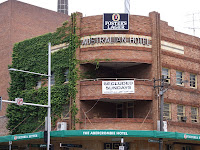

Exposition Beautiful Minds, UTS Sydney
(
http://www.nobel.uts.edu.au/)
Beautiful Minds is an extraordinary exhibition, developed by the Nobel Museumin Stockholm to celebrate 100 years of the Nobel Prize. The exhibition explores the creativity of the scientists, writers, economists and peacemakers who have been recognised by the Nobel Foundation. The exhibition examines questions such as, ‘what is creativity and how can creative activity best be encouraged? Does creativity rest with an individual or their environment?’
Beautiful minds has travelled to nine countries including Norway, Japan, Korea, America, Britain and Singapore. UTS is its only Australian destination.
It was today, in a beautiful Sunday morning mood, that I decided to have a look at this UTS exposition, going on until June 2007 in the building of the UTS, University of Technology Sydney.
With my brandnew camera, I walked to the main entry of our famous tower building and saw in Shanes’ eyes, my personal guide for today. Shane Ullman is science student at UTS, very interesting and with a lot of knowledge about physics, chemestry and sciences. His enthousiasm
about the exhibition helped me in clearly understanding the main scheme of the exposition with its main actors and destinations.
Beginning with Mr. Nobel, responsible for our dynamite, many others followed with the DNA, the radioactivity and heaps of other interesting theories.
Shane told me in an interview that Alfred Nobel, the discoverer of the Atombomb, even travelled to Australia and set there the origins of the national Nobel-Prize.
The exposition is not only about Nobel prize winners and their contents during the last century. It is also about History, Culture, contextualization and networks. Indeed, which role plays each individual in this huge network of science, economics and peace? How can every single person contribute to this giant network of knowledge? How can this knowledge be judged, evaluated? Who knows exactly that this nobel prize winner was de facto the real first one and not only some plagiarist destinated to steal the money of intelligence?
Another interesting question throughout the exposition was about nationalism of knowledge. What makes this installation very “norwegian”, where are the main ideas originated from? Which country get the biggest part of institutions? Where lays the link between knowledge and power? During the conference about nationalism of the nobel prize, the question of "why does Australia doesn;t have its own nobel-prize" was an interesting issue of the exhibition itself.
The exposition is awesome in many ways of consideration: the media installation in itself is one of the best I have ever seen, the multi cultural atmosphere makes us, international students, feel very comfortable; and the perfect coordination of lights, music and movie screens gives a great sense of harmony to the whole installation. Absolutely fantastic!

For further information:
http://www.utsnews.uts.edu.au/























